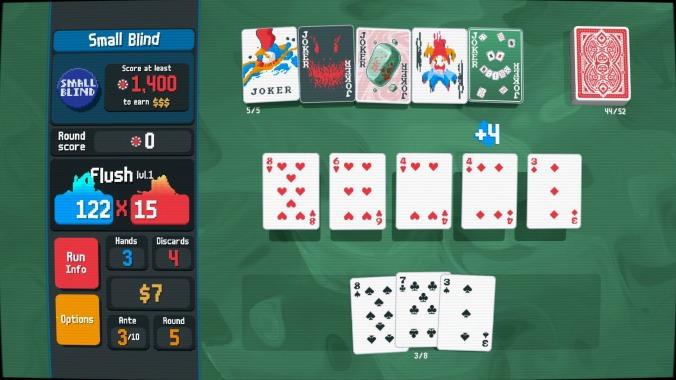Game Theory: Thank god, someone finally fixed poker
Balatro, the new "poker roguelike" from LocalThunk, lets you cheat your way to fun by blowing apart the basic rules of one of our oldest games

Every Friday, A.V. Club staffers kick off the weekend by taking a look at the world of gaming, diving in to the ideas that underpin the hobby we love with a bit of Game Theory. We’ll sound off in the space above, and invite you to respond down in the comments, telling us what you’re playing this weekend, and what theories it’s got you kicking around.
You know you’re playing a good poker video game when the developers need to come up with whole new, never-before-seen poker hands just to cover all the bullshit they’re letting you get away with. The first time Balatro, the ridiculously fun new poker roguelike from developer LocalThunk, invited us to submit for its approval a hand called a “Full Flush”—i.e., a full house wherein all the cards were the same suit, an utter impossibility in actual poker—we knew we were in good, stupidity-emboldening hands. If there’s one thing gambling has been missing, it’s the codified ability to cheat the system in your favor, and oh baby, does Balatro let you cheat.
In a historical context, LocalThunk’s new game, which has been burning up social media and Twitch, exists in a sub-genre of indie games that could be loosely summarized as “What if traditional gambling games weren’t deliberately horseshit?” The ur-example is probably TrampolineTales’ explicitly anti-capitalist Luck Be A Landlord, which presents the entire Western money-making structure as a slot machine that randomly doles out cash, with the player forced to scheme, plan, and deal to add symbols to the spinning wheels that’ll let them stay ahead of ever-rising rents. (See also the upcoming Dungeons And Degenerate Gamblers, which applies this same veneer to blackjack, as well as David Sirlin’s “sequel to gambling” physical board games, like poker-based Pandante, which allow players additional power by codifying “cheating.”)
All of these titles seek to address the basic problem with gambling games, as games, i.e., that they’re unambiguous money sinks set up to drain cash from people, with no real ability to influence the outcome of what’s happening on the table. (To the extent that blackjack players are often literally punished for trying to apply basic understanding of probabilities to the “game” in the form of counting cards.) Games like Balatro try to chip the actual game back out of this money-suck structure by introducing mechanics that let you substitute planning, strategy, and sheer beautiful brokenness for the vagaries of genuine luck. The appeal, then, is two-fold: There’s the pleasure of the game itself, of course, and then also the meta-joy of beating the system; the house always wins in gambling, but in video gaming, there’s not much it can do against the metaphorical equivalent of some well-placed C4 charges.
In Balatro, said ordnance arrives in the form of a series of mechanics that allow players to cheat its base play, a sort of solitaire version of stud poker, at will. These can range from one-use cards that allow you to, say, turn three cards in your deck into clubs—making hands that rely on same-suit cards far easier to produce—to Jokers that massively mutate how hands are played or scored. (We love the one that makes straights only require four cards to “count,” giving you a huge amount of flexibility to put together high-scoring hands.) It turns out it’s a lot easier to accrue a ton of chips at the poker table when a third of your deck is made up of aces, even before you start working in score multipliers and other mechanics that push you to deform the game’s basic play to keep up with increasingly stringent score requirements to stay alive.
By taking indie games’ “deckbuilding” style of game and applying it backwards to the most basic, long-standing card games we’ve got, Balatro makes a meal out of the sense that it’s letting players get away with something—the most delicious sensation a gambler can indulge in. There’s something giddy about pulling a hand of buffed-up cards that you’ve spent the game making completely broken, slamming them down on the table, and watching the massive numbers explode on the screen. The fact that it can let you get completely ridiculously while also having serious mechanical depth—challenge rounds can impose tough, brain-busting limitations on the hands you can play, while an escalating series of difficulties push you to get ever more ambitious in your strategy—makes it an early contender for the best new roguelike of the year.